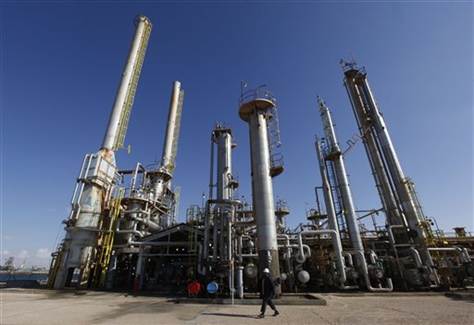LATEST: Egypt — Interim PM Backs Away from Dissolution of Muslim Brotherhood
The largest oilfields in western Libya have been closed after an armed group shut down the pipeline linking them to ports.
The cut-off, combined with halts to production because of striking workers and dissatisfied guards, means that total Libyan oil output is just under 200,000 barrels per day — a fraction of the level of about 1.6 million bpd before the uprising against the Qaddafi regime in 2011.
The oilfields in the west, El Feel and El Sharara, have a combined capacity of about 500,000 bpd.
In the east, striking workers, seeking autonomy for the eastern region, had already cut Libyan oil output by more than 50%.
Deputy Oil Minister Abdelbari Al-Arusi said the protest had cost the country $2 billion in lost revenues: “If the strikes continue, we will reach very terrifying figures in losses.”
Al-Arusi said the oil ports of Es Sider, Ras Lanuf, Zueitina, and Marsa al Hariga, remain closed.
Only Marsa al Brega, which loaded its first tanks in more than two weeks over the weekend, is open.
Latest Updates, From Top to Bottom
Egypt: Interim PM Backs Away from Dissolution of Muslim Brotherhood
Interim Prime Minister Hazem El-Beblawi has backed away from a proposal to dissolve the Muslim Brotherhood, the main force behind the deposed Morsi Government.
“Dissolving the party or the group is not the solution and it is wrong to make decisions in turbulent situations,” El-Beblawi said. “It is better for us to monitor parties and groups in the framework of political action without dissolving them or having them act in secret.”
On August 17, El-Beblawi proposed to the Social Affairs Minister that the Brotherhood’s license be revoked.
Iraq: Death Toll Now 49 From Bombings
The death toll from coordinated car bombs, mostly in Shiite neighbourhoods in Baghdad during rush hour, has risen to at least 49.
There were at least a dozen explosions — including car bombs and at least one suicide attack — wounding about 150 people.
The deadliest attack was in the Jisr al-Diyala neighbourhood of southeast Baghdad, with at least seven people killed and 21 wounded in twin bombings.
Blasts also went off in neighbourhoods such as Kadhimiyah and Sadr City.
Iraq: At Least 16 Killed In Bombings Across Baghdad
At least 16 people were killed and 85 wounded by a series of bombs across Baghdad on Wednesday morning.
The deadliest attack was in Kadhimiya, a district in the northwest of the capital, where two roadside bombs and one car bomb killed five people and wounded almost 30.
Violence in Iraq is at its worst level in five year, with more than 1,000 people killed in July.
Egypt PM: Dispersal of Pro-Morsi Sit-Ins Was “Necessary and Inevitable”
Interim Prime Minister Hazem El-Beblawi said the violent dispersal of two sit-ins supporting deposed President Mohamed Morsi, killing several hundred Egyptians, was “necessary and inevitable“, because they hindered the progress of the post-Morsi political “road map”.
“Mediation failed because there were no constructive suggestions,” El-Beblawi said in a TV interview on Tuesday evening. “The government could not have proceeded with amending the constitution and holding polls without dispersing [the camps] in Rabaa and Nahda squares — especially as they were not peaceful.”
On August 14, security forces cleared the sit-ins, which were started days before Morsi’s overthrow on July 3. Officially, at least 745 people were killed in violence in Cairo and across the country.
El-Beblawi added that the only member of the National Defence Council – assembled and headed by interim President Adly Mansour – was former vice president Mohamed ElBaradei, who resigned following the dispersal of the protests.
El-Beblawi declared that the Egyptian military does not want to re-enter politics: “The military has supported popular movement, but military leaders realise that those who have most to lose from military rule are military men themselves.”

